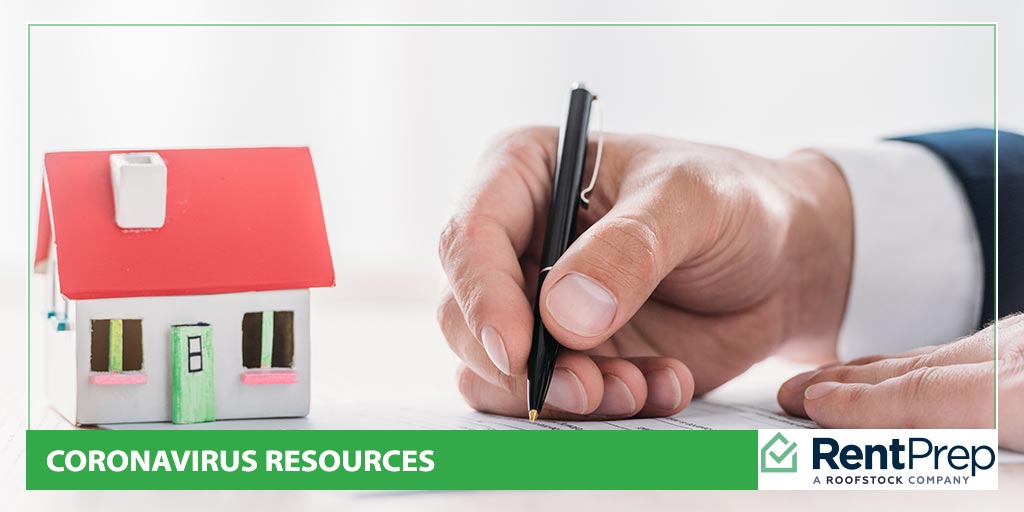
The COVID-19 pandemic was not a situation that any landlord or renter was truly prepared for, and it is a situation that all parties are trying their best to work through. Work has been disrupted for many, and others are no longer receiving a regular paycheck. This has impacted the rental industry, and it’s time to see what we can do to proceed.
Landlords and renters: there are resources out there to help you through this trying time. Whether rent is coming up short or the mortgage isn’t getting paid, there are a few different ways that you might be able to find support.
Let’s walk through different resources, tactics, and benefits that might be able to help both landlords and renters make it through this rough patch.
A Table Of Contents For Landlord And Renter COVID-19 Relief
- Federal Assistance: CARES Act
- State-By-State Information
- Consider Your Cities And Counties
- Landlord Specific Relief
- Renter Specific Relief
- Keep The Conversation Open
Federal Assistance: CARES Act Explained
One of the biggest initiatives that renters and landlords should be aware of at this time is the CARES Act. This federal relief package was designed to ensure that those using federally-funded mortgages and housing are not going to be left in an impossible situation.
What Is The CARES Act?

The CARES Act, established on March 27, 2020, sets up guidelines for eviction relief for renters living in federally-backed housing. It also gives landlords information about the eviction moratorium and what can be expected during this period.
The act also includes other types of indirect assistance that may help both landlords and renters to manage this situation, such as a stimulus check.
How Does The Eviction Moratorium Work?
The CARES Act specifies that tenants have 120 days of eviction relief. This means that tenants who cannot pay rent due to the pandemic cannot be served an eviction notice until July 25, 2020. Any notice served at that time must give tenants 30 days, until August 24th, to vacate the property.
During this 120-day period, landlords cannot:
- Charge late fees
- Charge any penalties for late rent payments
While the moratorium prevents evictions from happening for 120 days, that does not mean that renters are not responsible for paying the rent. Rent must still be paid, and if renters have not paid owed rent by the end of the moratorium period, they can still be evicted.
What Housing Is Considered Federally-Backed?
Some landlords may have a good idea of whether or not their property is considered to be federally-backed, but renters are often unaware of this information.
Qualifying housing for this moratorium is as follows:
- Housing covered under the Violence Against Women Act
- Housing covered under the rural housing voucher program
- Rental units that have a federally-backed mortgage (i.e., through Fannie Mae or Freddie Mac)
Does The CARES Act Provide Rental Assistance?
The Department of Housing and Urban Development, HUD, has been given additional funding through the CARES Act. This $17.4 billion is to be used to increase rent assistance, public housing options, housing vouchers, and elderly housing for those affected by the pandemic.
If you or your tenants are interested in finding out if you would be eligible to receive some of this assistance, visit HUD’s COVID-19 resource page for more information.
Additional CARES Act Support
Housing is not the only thing addressed in the CARES Act; it also provides some other assistance to Americans who are dealing with this difficult period. All-in-all, the legislation has set up over $2.2 trillion in recovery benefits for Americans.
Stimulus Checks
All eligible Americans will be receiving some type of recovery benefits through the CARES Act. The most that any individual will receive is $1,200 ($2,400 for joint-filing couples) as well as an additional $500 for each child under the age of 16. The amount you will receive will decrease as your income goes up until the stimulus disappears completely.
Unemployment Benefits Extended
The CARES Act also set up some expanded unemployment insurance for those who have lost their job or faced a reduction in their hours because of COVID-19.
In addition to state benefits, federal unemployment assistance will be given for up to 13 additional weeks. The federal government will also supplement state unemployment with an extra $600 per week.
These benefits may be available for full-time employees, part-time employees, independent contractors, and gig economy workers. While many of these groups are often excluded from unemployment benefits, the CARES Act ensured they could find some relief as well.
State-By-State Information
If you are familiar with rental law, you know that many of the laws’ nuances are decided at the state level. In terms of the response to COVID-19, the same can be said, and it’s important for landlords and renters to find out what assistance and guidelines are being issued by their state.
Many states have already halted evictions, placed a hold on evictions being carried out, or are currently considering such measures:
- Washington
- California
- Arizona
- Texas
- Kansas
- Iowa
- Connecticut
- Delaware
- Hawaii
- Pennsylvania
- Illinois
- Oregon
- Indiana
- South Carolina
- Tennessee
- Kentucky
- Virginia
- D.C.
- Wisconsin
- Louisiana
- North Carolina
- Maryland
- Michigan
- Minnesota
- New Hampshire
- New York
Each state has its own specific rules about how the eviction moratorium works, when it will be in effect until, and what types of properties are eligible. To be sure you are in-the-know about your state, be sure to check the details of how evictions are being handled during this crisis period.
At this time, we have created state-specific resource guides for the following states:
- New York
- New Jersey
- Michigan
- California
- Florida
- Massachusetts
- Illinois
- Louisiana
- Washington
- Pennsylvania
If your state is not listed, search for your state’s COVID-19 resource page. From there, you should be able to find information about mortgage forbearance, rent assistance, unemployment, and more.
Consider Your Cities And Counties

In addition to state-funded benefits, many cities and counties may be setting up their own guidelines for rental properties as well as financial support. Rental assistance may be available from local jurisdictions, but those same jurisdictions may also put in place stricter eviction moratorium guidelines.
As with your state information, it is important to stay informed about what your local government is doing during the pandemic. Make sure to look up the responses from both your city and your county during this time so you have all the information that you might need and want to have on hand.
Landlord Specific Relief Efforts
For some landlords, this may seem like a make-or-break-it period for your business. While this is certainly a time of great upheaval, that doesn’t necessarily mean your business is going to go completely downhill. Many relief efforts can help support landlords throughout the crisis.
In particular, it is important to find out if you qualify for the following.
Mortgage Forbearance
Many national and local financial institutions are setting up mortgage deferments for those who are going to be unable to keep up with payments during this period. The length of the forbearance ranges from 60 to 120 days depending on the institution, but most are allowing delayed payments with no penalties.
To find out if your lender has any COVID-19 relief in place, check out their website or give them a call. Once you know their policy, it will be easier to move forward on planning out your financials.
Small Business Assistance
Depending on how you structure your business, you may be eligible for a small business loan to keep any employees or contractors employed during this difficult time. These types of loans have various eligibility requirements depending on who is providing them, so you will need to check the details from those organizations.
The best way to find these programs is to search your state, city, and county name alongside “COVID-19 small business relief.” Usually, you’ll be able to find a listing of the currently available resources.
Renter Specific Relief Efforts
The trials that renters are going through at this time are going to be a bit different from those of landlords, so it is important to give you access to the resources that might help you. Landlords can also benefit from having this information on hand to provide to renters in need.
Fannie Mae Disaster Recovery Network
The Disaster Recovery Network has set up a recovery network to help renters affected by the COVID-19 pandemic to navigate their changing situation. This resource guide outlines what options are available to you, how you can contact Fannie Mae for advice, and what type of advice to expect when using the service.
Job Listings
If you or your tenant has lost their job during this time, it may be of interest to find another job. Not everyone is going to feel comfortable working during this period, but some want to continue working and helping in essential sectors.
Many states and regions have created COVID-19 job listing pages because companies are struggling to find employees. Often, these positions come with hazard pay.
Of course, it is up to you to decide if you want to find new employment during this time; this is a personal decision and should not be taken lightly.
Expanded COVID-19 Unemployment
In addition to the expanded unemployment offered by the federal government, most states are offering expanded unemployment benefits to those who have been directly affected by the COVID-19 crisis. If you have lost hours or employment because of the pandemic, it is worth checking into these resources to see if you are eligible.
The best way to find this information is to search for your state’s name alongside “COVID-19 unemployment” to find your state’s unemployment page. Many states have put together specific COVID-19 response pages, and those can be very helpful when navigating your next steps.
Keep The Conversation Open
Landlords and renters both need to be mindful of the difficult situation that both parties are going through at this time.
For renters, it can be very stressful to not be able to know where your rent money is going to come from when you have lost your income. It may also feel like landlords are being greedy to expect a payment, but their income is also being affected by this situation.
For landlords, it can be equally stressful to lose your rental income, especially if your primary source of income comes from your property management work. Additionally, making mortgage payments might be hard if the rental income typically went straight to the mortgage.
The key thing to do is to keep communication with each other open.
Landlords should be talking to their tenants and asking them to communicate their difficulties as well as any potential rent issues. Additionally, they should be providing links to support resources such as those outlined in today’s article to their tenants so they can navigate this situation together.
Renters should get into contact with their landlords as soon as their job or paycheck is affected by the pandemic, especially if they are worried that they won’t have enough to make rent. Talking with your landlord about when you expect to pay will keep both parties more comfortable.
Constantly Evolving
For now, those are the resources landlords and renters should be most aware of. Remember, however, that this pandemic and the response to it are still evolving. The situation, legislation, and provisions that affect rental properties may change in the future, so you will want to keep an eye on any updates.
Throughout this situation, RentPrep will aim to create updated resource guides, but the most up-to-date information can always be found from official local, state, and federal government resources.

